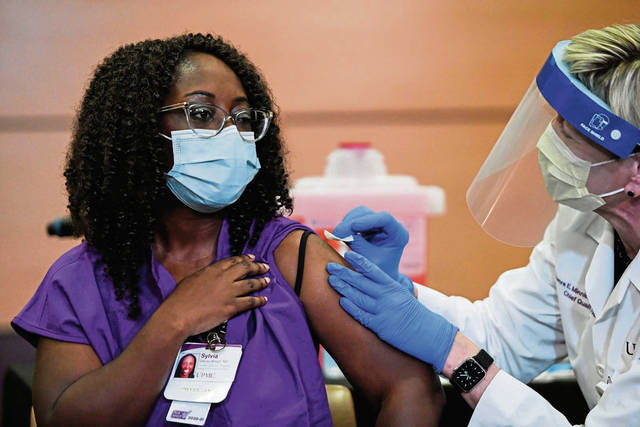The determination on the face of intensive care unit nurse Sandra Lindsay as she got one of the first covid-19 vaccine shots was unforgettable. And what she said about it summed up the task for all of us: “We’re in a pandemic, so we all need to do our part.”
Lindsay, an African American based in New York, also sent a powerful message about the safety of a vaccine, one that could resonate with people who might still harbor mistrust. She was the essence of a great communications plan: simple message, trusted messenger.
The covid-19 vaccine is our ticket back to normalcy, but we have much work to do to ensure that everyone gets the information they need to agree to take it. While government officials, health care workers and the vaccine makers play the critical role in getting the vaccine to us, that does not leave the rest of us out of the picture. We all should play a part, because the stakes are too high to just leave the work to others.
It will be up to everyone in a leadership role, no matter the size of the team or organization, to help in that task. It will require effective and empathetic communication, and nowhere will that be more important than for communities of color that have for many good reasons mistrusted the medical establishment.
That mistrust is decades old, and it is largely why confidence among Blacks about taking the vaccine is significantly lower than that for those who are white or Hispanic, according to this Kaiser Family Foundation Poll.
We must acknowledge that distrust. Black leaders have too rarely been allowed to have the influential decision-making roles to ensure that the interests of Black Americans are truly considered. So how every organization, institution and individual behaves in regard to the vaccine has a lot to do with whether our citizens have widespread trust enough to take it.
Some of the trust rebuild has to come by a collective acknowledgement that we are all in this together. America has always had a tension between an individual’s own right to freedom and our collective interest as a community, a state, a region, a nation. But this pandemic should have taught all of us that our relationship with those around us is just as important as our personal right to assert our individuality.
The Business Roundtable did something like this in 2019, when it took a stand to redefine the purpose of a corporation and declared that shareholder interests were not the only interest for a corporation. It was a powerful statement in favor of the need to align individual interests with our collective interest.
This is key to building trust, a demonstration of respect for the lives of others, their dignity and their worth in all of our human interactions. This is also at the core of a vaccine confidence campaign. Building trust so everyone can feel confident taking the vaccine will require not just effective messages, but the right messengers, people who can meet and reach people where they are. In fact, the messenger may be more important than the details of the message.
We need people with credibility in all communities to step forward and do their part. At the top of the list will be health professionals. But people from all walks of life need to not just get the vaccine, but share their experiences, especially within their own community. Pastors and other faith leaders, creative artists, local small business owners can all do their part in the way they know how — a sermon, a video to share on social media, even a simple poster in a store — all to help people understand the vaccine so they can take care of their health.
Even people outside these roles can play a part, by participating or helping to fund efforts in their communities. Our simple message to everyone who wants to play a role in getting more people to take the vaccine is this: find people in your company, organization or community, and ask how you can help. If you can, find your own Sandra Lindsay.
Slowly but surely, we can move some of the people who might be a soft “no” or a “maybe” to a “yes.” We can first listen to their concerns and then we can work with them to get the information they need to overcome objections.
A step at a time, a person at a time, we can get that ticket back to normalcy and make the world a healthier place.
Reed Tuckson, M.D., is a co-founder of the Black Coalition Against COVID and a former District of Columbia Commissioner of Public Health. Jim Weiss is founder and chief executive officer of W2O, a health care marketing and communications agency.








